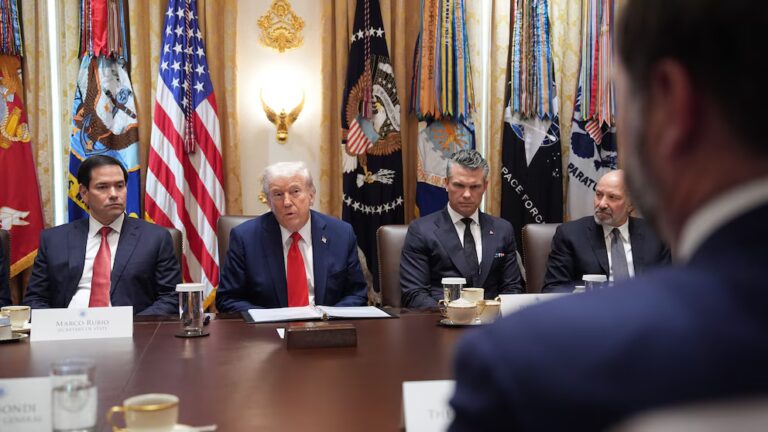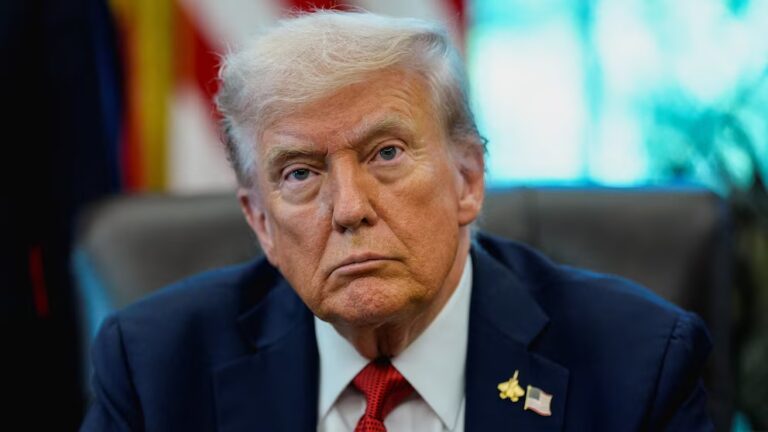
“I do think that’s a human right to have access to health care,” said Kate, a 55-year-old with one child still at home. “It’s like having access to clean water, food, and everything. It’s a basic human right.”
“Having basic health care, I think, should be something that a citizenship should provide,” 27-year-old Devin said. “If you have a sick community, you have a sick workforce, you have sick people. You have death. You have low productivity from it. So I think that as a step back from all of it, then yes, health care I think should be a right.”
“I think everybody deserves [health care],” Cindy, a 45-year-old with a teenage daughter, said.
We’re sitting at a table in Harrisburg, Pennsylvania, talking about the prospect of universal health care. There’s just one thing about the people saying these words that might surprise you: Each and every one of them is a Republican who voted for Donald Trump in 2016.
Fresh off the GOP’s failed Obamacare repeal crusade and amid the Democratic embrace of Medicare-for-all, we wanted to get a better sense of how voters really feel about the most ambitious health care plan out there: universal single-payer health care. The group’s moderator Michael Perry, who runs the public opinion research firm PerryUndem, started with this basic question: Is health care a right?
Some of the answers didn’t surprise us — GOP voters still harbor plenty of animus for “Obamacare” and “socialism” and warned of the dangers of people getting health care who didn’t work or contribute to their society — but the handful who voiced support for universal health care are a growing minority of the Republican Party.
The Republican Party made a full-throated effort to repeal the Obama administration’s Affordable Care Act, the most significant expansion of health insurance in 50 years, in 2017. But they soon discovered it was the single-payer aspects of the law that proved to be the most durable: Cuts to Medicaid and the rollback of Medicaid expansion were among the most politically unpalatable pieces of their plan. Most Republican lawmakers still supported it, but a few balked.
Republican voters, as we discovered, seem to have a more complex view than just “repeal and replace Obamacare.” Some of them really believe health care is a right, a perspective shaped by their personal experiences with the health care system. They are starting to think, however reluctantly, that the government might be necessary to guaranteeing health care to every American.
America’s shortcomings are driving some Republicans to believe health care is a right
The idea that health care is a right has become a growing consensus on the left. Barack Obama famously used the line to defend the Affordable Care Act. And it is the fundamental argument behind Sen. Bernie Sanders’s (I-VT) Medicare-for-all plan. His revised plan garnered more than a dozen Democratic co-sponsors in the Senate earlier this year.
Though Democrats are driving the popularity of universal health care, it’s not just Democrats who increasingly support this idea. The number of Americans who said they believed it is the federal government’s responsibility to provide every American with health coverage increased by 10 percent between March and July of last year, according to an AP-NORC poll. The Pew Research Center found the share of Americans who believe in universal coverage was at 60 percent in January 2017.
Support grew from 19 percent to 32 percent among Republican and lean-Republican voters from 2016 to 2017 — outpacing the 8-point upswing among Democrats to 85 percent, according to Pew. Republicans who believe health care is a right are still a minority, but a sizable and growing one.
So we wanted to go deeper. We pulled together two groups of eight Trump voters, 16 in total, for 90-minute conversations last fall about health care in America. We consciously sought an ideological mix of people: some at least receptive to the idea of a government-run system, others totally opposed.
We found that long-held beliefs about America are a real hurdle for some voters when it comes to single-payer health care. But at least a few Republicans were starting to see the value of a universal health care program.
What’s persuading Republican voters to entertain universal health care?
What’s perhaps most interesting, based on our conversations in Harrisburg, is why some of these Republicans are coming to believe that health care should be a guarantee, not a privilege.
Among Democrats, as pollsters told me earlier this year, supporting Medicare-for-all is largely a proxy for supporting universal programs, particularly with young voters.
“When you say, ‘I’m for that,’ it says that ‘I’m for equity.’ It says, ‘I’m gonna fight back against the corporate establishment,” Robert Blendon, a professor of health policy and political analysis at Harvard University’s public health school, where he conducts polls on health care, told me. “They are not health care voters, but essentially it’s symbolic of these other things which appeal to young liberal people.”
But among Republicans, based on our interviews, believing health care is a right and entertaining the idea of single-payer health care seemed to be founded on their own negative experiences with the current system.
Take Kate. She didn’t like her current insurance, which she got through her employer. “The deductibles have just skyrocketed,” she told us.
Americans like Kate are paying more out of their own pockets for health care, even with employer-sponsored coverage. The average deductible in employer coverage has increased from less than $600 to more than $1,500 since 2006. Since 1999, employee contributions for their insurance premiums have risen 270 percent — while wages have grown only 64 percent, barely above inflation.
Employer insurance is still the bedrock of American health care, but it’s not quite the deal it once was. People like Kate have felt the shift.
She and her husband already sometimes struggle to afford their mortgage. Then her son fell recently, and they had a $400 bill for the X-ray. “Not in the budget that month, but we have to find it because it goes to our deductible,” she said. “It’s a struggle.”
She also knows people who have lost jobs and couldn’t afford insurance. Does Kate, who identifies as a “die-hard Republican,” therefore believe health care is a right?
“I’m conflicted,” she said. “I’m truly conflicted.”
Her thoughts are worth reading in full:
That was a repeated theme: People who had struggled in the current system seem more inclined to see health care as a right. Megan, a 42-year-old who works in retail, said she had seen her friends struggle to afford insurance, and she herself had gone eight years without coverage. She was on Medicaid now and getting ready to start a new job that offered insurance.
So Kate, Megan, Devin, and others — “Yeah, I think every citizen should have an innate right to be offered affordable, quality care,” Tara, a 35-year-old victims advocate, said — are part of that contingent of Republican voters who believe health care should be a right for all people.
They represent a meaningful shift in American health care politics. But they aren’t yet a majority in the ideologically conservative party.
Other Republican voters are stuck on who really deserves health care
These few are still, for now, the exception in the Republican Party. Two other strands persisted across our conversations with 16 Trump voters: A strict constitutional view says health care is not a right — and then there is the question of who actually deserves health care.
“Well, you have a right for life, liberty, and the pursuit of happiness,” Dave, a 62-year-old engineer, said. “Where in the Constitution does it say you have a right to free food, free services, or free health care?”
Charlie, a 42-year-old who said he was very conservative, agreed: “It’s not in the Constitution. Nowhere in there does it say, ‘I guarantee you can go see the doctor.’”
There were the expected objections to the federal government running any kind of universal health care program: It’s socialism. The federal government meddles too much already. People want to have choices in their health care. They’ve heard horror stories about long waits in other countries. They’re worried their taxes will go up to pay for this new health care program.
Throughout the discussion, particularly as the question of costs came up, these Trump voters returned to the same concern, which presents perhaps the most fundamental challenge to health care as a human right: Does everybody really deserve health care?
Some of these folks didn’t sound convinced.
“So if everybody’s paying the same percentage of tax, unemployed people are presumably gonna be free,” Dan, a 52-year-old school secretary, told us. “The more money you make, the more money you’re gonna pay for the same exact coverage that everybody gets.”
Or as Kevin, a 37-year-old who said he liked his current insurance, put it: “My biggest problem is the people that don’t work, what’s the incentive? I’m skyrocketing to help pay for them?”
It permeated the questions they had about a single-payer program.
“So in this, what you just described, a payroll tax, anybody not working is not contributing at all to it? Is that accurate?” asked Danielle, a 33-year-old who said she was a strong Republican.
When my colleague Sarah Kliff clarified that single-payer health care would be financed through a combination of payroll and sales taxes, Danielle added, “Except if you don’t have money to buy things, then you’re not paying sales tax.”
This was a theme, again and again, sometimes raised subtly, sometimes stated outright. I learned that a sizable number of Republican voters are wary of a system in which people who don’t work and make less money would have the same health care as the people who work hard.
Single-payer challenges what some people think America is and should be
Medicare-for-all, health care as a human right — these issues are, for people like Rick, a 58-year-old who voted for John McCain and Mitt Romney before Trump, existential questions. America, to them, is not a country that makes no distinction between people who contribute to our society and the people who don’t.
“If you take away all incentives to perform, if you take away Americans’ incentive to work hard, to perform, and to be a little better and not to look down, ‘I can afford this, you can’t.’ I mean, that’s capitalism,” Rick said. “If we tell everybody, ‘It doesn’t matter what you do, this is what you get,’ what do you think is gonna happen to us?”
They aren’t necessarily persuaded by tales of woe from some of their fellow Republican voters either. The system is mostly working for them — all but a few have insurance through their work — and they have very fixed ideas about what is an American notion of health care and what is not.
“I think every employee has a right to health care. We’re not ready for every American,” Rick says. “First off, what is an American? We couldn’t really afford that; we couldn’t bank on that. How can we implement that? Every employee that works in America should have health care, I think.”
Megan, who had gone years without health coverage, interrupted and gestured to Cindy, who had earlier shared a story about a friend with children who was struggling to find work and afford health insurance.
“So you’re saying that her friend, who is a mother of two, she doesn’t deserve it?” Megan said to Rick. “She doesn’t deserve health care because she doesn’t work? What about her children?”
“It’s complex,” Rick offered.
“I have a friend in the same situation,” Megan said. “She just got a job. She’s scraping things together.”
“If you have it that way, now we’re socialists. That’s the way it is,” Rick said by way of a conclusion. “Where we’re at, it’s very complex.”
Sourse: vox.com






